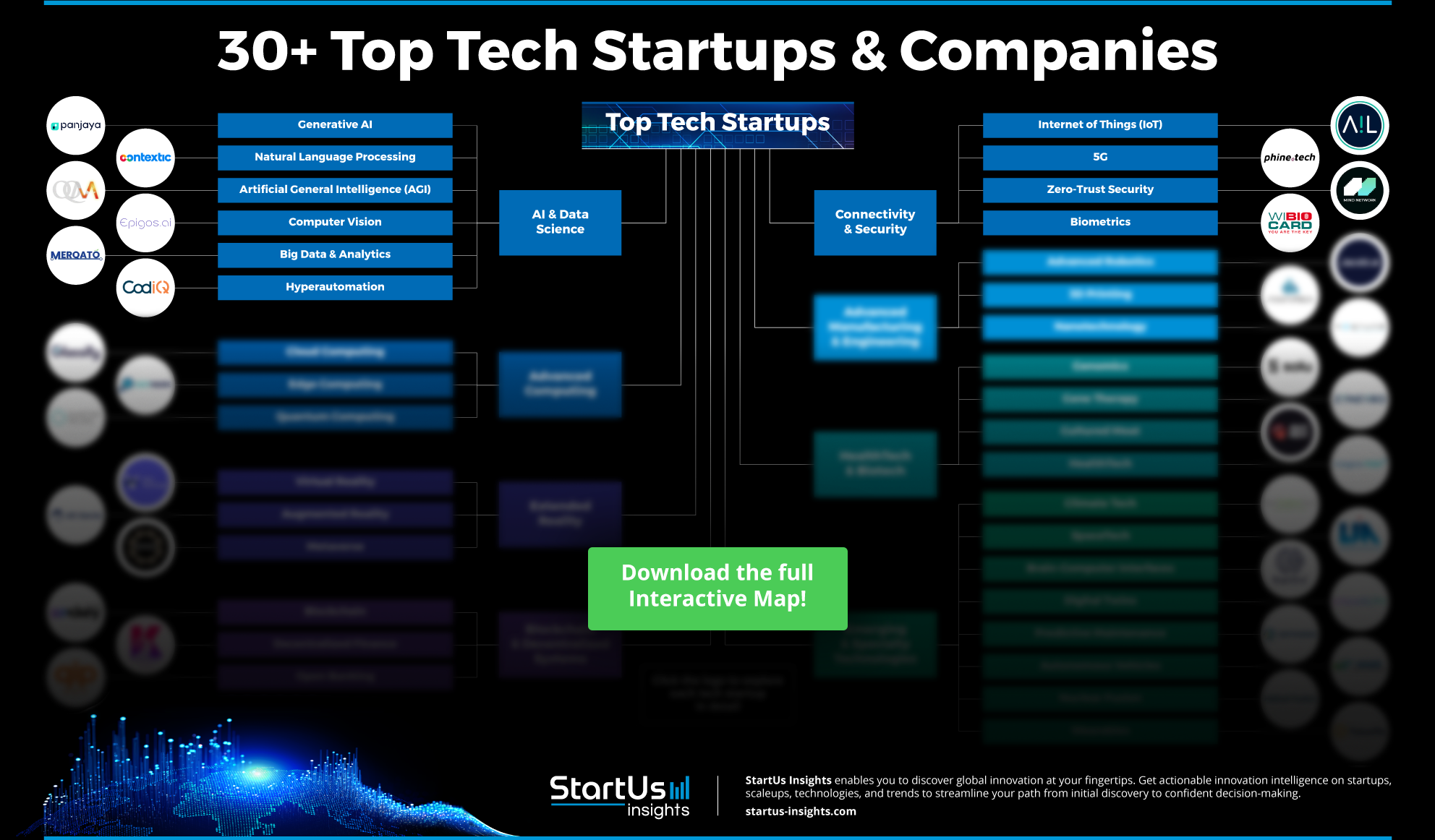Generative AI solutions in the eCommerce industry address key challenges such as delivering personalized customer experiences, proper inventory management, targeted marketing, and improving website performance. The technology enables virtual shopping assistants, dynamic content generation and provides real-time insights into market conditions. Virtual try-ons, AI-powered conversation agents, and targeted product listings further improve customer engagement and conversion rates. For example, Indian startup Verifast increases sales through improved product discovery.
As the applications of generative AI in eCommerce continue to evolve, stakeholders need to integrate these emerging innovations into their operations to optimize research capabilities, enhance data-driven decision-making, and address the increasing demand for better customer solutions.
Why should you read this report?
- Gain insights into the top 10 applications of generative AI in eCommerce
- Learn about two practical use cases for each application
- Meet 10 innovative startups advancing these applications

Key Takeaways
- Personalized Product Recommendations
- Use Cases:
- Dynamic Product Suggestions
- Predictive Cross-Selling and Upselling
- Startup to Watch: Naratix
- Use Cases:
- Conversational Commerce
- Use Cases:
- Automated Customer Support
- Personalized Shopping Assistance
- Startup to Watch: Verifast
- Use Cases:
- Visual Search and Image Generation
- Use Cases:
- Image-based Product Search
- Automated Product Image Generation
- Startup to Watch: Lupa Search
- Use Cases:
- Fraud Detection and Prevention
- Use Cases:
- Behavioral Modeling
- Identity Verification
- Startup to Watch:
- Use Cases:
- Price Optimization
- Use Cases:
- Dynamic Pricing
- Promotion and Discount Simulations
- Startup to Watch: Forloop.ai
- Use Cases:
- Customer Segmentation and Targeting
- Use Cases:
- Dynamic Audience Segmentation
- Automated Campaign Content Creation
- Startup to Watch: Radd
- Use Cases:
- Virtual Try-Ons
- Use Cases:
- Interactive Style Recommendations
- Enhanced Product Visualization
- Startup to Watch: Cleed.ai
- Use Cases:
- Sentiment Analysis
- Use Cases:
- Product Review Analysis
- Market Trend Identification
- Startup to Watch: VOC.ai
- Use Cases:
- Inventory and Supply Chain Management
- Use Cases:
- Demand Forecasting
- Inventory Optimization
- Startup to Watch: WhyLabs
- Use Cases:
- Product and Display Design
- Use Cases:
- Dynamic Visual Merchandising
- Virtual Prototyping and Testing
- Startup to Watch: Pebblely
- Use Cases:
FAQs: Applications of Generative AI in eCommerce
1. How does generative AI affect eCommerce?
Generative AI reshapes eCommerce by enhancing product personalization and streamlining content creation. It enables businesses to generate tailored product descriptions and advertising copy, significantly reducing manual efforts and increasing efficiency. Additionally, generative AI assists in developing virtual try-on experiences, allowing customers to visualize products, such as clothing or accessories, in real-time. This capability boosts engagement and reduces return rates. Moreover, the use of generative AI in customer service (ie. chatbots) improves response times and provides more accurate, context-driven assistance, enhancing the overall customer experience.
2. How can artificial intelligence be used in eCommerce?
Artificial intelligence optimizes eCommerce operations through personalized recommendations, inventory management, and dynamic pricing. AI algorithms analyze customer data, browsing history, and preferences to offer tailored product suggestions, driving higher conversion rates. In inventory management, AI predicts demand, ensuring optimal stock levels and reducing overstock or shortages. Additionally, dynamic pricing algorithms adjust product prices based on factors like competitor pricing, demand, and seasonality, maximizing revenue. By automating these processes, AI increases operational efficiency and delivers a more customized shopping experience for customers.
Where is this Data from?
StartUs Insights provides data through its comprehensive Discovery Platform, which covers 4.7+ million startups, scaleups, and tech companies globally, as well as 20K+ emerging technologies & trends. The platform excels in startup and technology scouting, trend intelligence, and patent searches, offering a detailed view of the innovation landscape. For this report, we analyzed technologies within specific industries using the trend intelligence feature. During this research, we identified patterns and trends, pinpointing relevant use cases and the startups developing solutions for each. More capabilities and details are available at StartUs Insights Discovery Platform.
Top 10 Applications of Generative AI in eCommerce [2025 & Beyond]
1. Personalized Product Recommendations
Generative AI utilizes machine learning and deep learning algorithms to analyze large datasets of customer data, predict future preferences, and provide dynamic product recommendations. This results in engaging and relevant shopping experiences and thus increases the probability of purchase. Further, predictive cross-selling and upselling, suggest additional higher-value products that a customer wants to order based on their current selections or past behavior. This approach increases average order values and improves customer satisfaction by offering relevant additions to their purchases.
Diver Deeper:
- Noteworthy Example: Alibaba has implemented generative AI tools for personalized product recommendations which led to a significant increase in orders.
- Financial Landscape: Generative AI startups working on personalized product recommendations in the eCommerce industry receive USD 9.8 million in funding on average.
Startup to Watch: Naratix
Romanian startup Naratix offers personalized product support and shopping assistance using generative AI. The company’s product GINA, an AI-sales agent, interacts with customers to understand their unique needs and preferences. GINA offers multi-lingual support, manages order tracking, and builds customer satisfaction while integrating into existing systems and platforms for better operation cycles. This approach enhances conversion rates and reduces operational costs. Other products include NARA which generates on-the-spot product descriptions and Dynamo which modifies unstructured customer data into meaningful attributes and insights.
2. Conversational Commerce
By leveraging natural language processing (NLP), AI-powered chatbots and virtual assistants offer human-like conversations that address customer queries and improve satisfaction. Automated customer support includes features like order tracking, accurate order information, and refund initiation without human support. These systems reduce response times and operational costs compared to traditional inquiries. Personalized virtual assistants take shopping one step further by engaging customers with natural language conversations and guiding them in purchasing products based on their suggestions. This approach improves sales, enhances shopping experiences, and fosters stronger customer loyalty.
Diver Deeper:
- Noteworthy Example: Wayfair uses generative AI to integrate text and image data for better output during conversations of AI agents with customers.
- Financial Landscape: Generative AI startups working on conversational commerce solutions receive an average of USD 22.2 million in funding.
Startup to Watch: Verifast
Indian startup Verifast develops a conversational eCommerce platform powered by generative AI. The platform acts as an AI-sales agent and offers personalized experiences from customer support to product recommendations. It captures online visitors’ interest and converts them into prospects. Through personalized interactions, the platform guides website visitors to complete purchases and extracts insights for campaigns. It thereby elevates customer experiences through better product discovery and purchase journeys.
3. Visual Search and Image Generation
Convolutional neural networks (CNNs) and generative adversarial networks (GANs) enable image analysis and image creation to provide instant matches or similar items from a retailer’s inventory. This impacts the shopping experience as customers can find items that they are not able to describe through text alone. Automated product image generation allows retailers to create product images by inputting basic product information and technical descriptions. Generative AI then creates multiple variations of product images, with different lighting conditions and backgrounds for the seller to choose from.
Diver Deeper:
- Noteworthy Example: Amazon has introduced AI-powered image generation to help brands become more creative and improve the customer’s ad performance
- Financial Landscape: Generative AI startups working on visual search and image generation solutions receive an average of USD 14.6 million in funding.
Startup to Watch: Lupa Search
Lithuanian startup Lupa Search provides a visual search and image generation platform that allows users to find products using images instead of text. The company’s platform enhances customer engagement with products they like through visual experience. The company’s product lupa sellsence boosts eCommerce sales with personalized recommendations by analyzing user behavior and preferences. This feature is based on machine learning models that learn from product data and past user interactions like clicks, previous searches, and search trends.
4. Price Optimization
Generative AI analyzes market trends, competitor pricing, and consumer behavior to determine optimal pricing strategies. It enables dynamic pricing strategies and promotion simulations to adjust product prices based on various factors such as demand fluctuations, competitor actions, or current market conditions. This approach enables eCommerce businesses to increase revenue by offering the right price at the right time. Moreover, generative AI facilitates promotion and discount simulation that permits businesses to predict the outcomes of various promotional strategies before implementation. By analyzing historical data and present market conditions, AI forecasts the impact of different discount levels on sales volume, revenue, and profit margins.
Diver Deeper:
- Noteworthy Example: Walmart is using generative AI for their proprietary platform Wallaby for enhancing product catalog management and personalizing pricing strategies.
- Financial Landscape: Generative AI startups working on price optimization solutions receive an average of USD 15.1 million in funding.
Startup to Watch: Forloop.ai
Swedish startup Forloop.ai develops a no-code platform that integrates external data with generative AI to optimize pricing strategies for eCommerce sectors. The company’s platform monitors prices and promotions across retailers in real-time to optimize prices against the competition. It also prevents sales loss by monitoring stock in real-time, providing timely alerts on competitor’s pricing as well as product launches across markets. The platform thereby enhances pricing accuracy and increases the sales revenue by fixing prices that align with real-time market conditions.
5. Fraud Detection and Prevention
By leveraging neural networks and machine learning algorithms, generative AI analyzes transaction data, customer behavior patterns, and fraud history cases. This process identifies potential threats with better accuracy and prevents suspicious transactions. Anomaly detection with behavioral modeling includes the creation of user profiles based on device usage, browsing behavior and alerts the user about any unusual activities in the account. By utilizing biometric techniques and document analysis, AI-powered systems verify the authenticity of the user with greater accuracy. These systems enhance identity verification and identify inconsistencies that humans miss.
Diver Deeper:
- Noteworthy Example: Dynamo AI uses generative AI to identify and analyze fraud patterns, automate threat detection, and ensure compliance with safety regulations in the e-commerce sector.
- Financial Landscape: Generative AI startups working on fraud detection and prevention solutions in the eCommerce industry receive an average of USD 2.6 million in funding.
Startup to Watch: Deduce
US-based startup Deduce detects identity fraud using generative AI. The company’s product detects fake identities and prevents them from becoming customers while increasing the authenticity of approved clients. Deduce offers features for anomaly detection, malware attacks, malicious network detection, and account legitimacy. By leveraging contextual data and behavioral analytics, the company minimizes false positives, and helps online stores lower fraud-related losses.

6. Customer Segmentation and Targeting
Generative AI utilizes machine learning algorithms to create personalized shopping experiences. It analyzes customer data, purchasing history, browsing behavior and demographic information to create dynamic audience segments. It groups customers to reflect the current behaviors and interests so they receive tailored product recommendations and marketing messages. For instance, GenAI generates specific email subject lines, product descriptions and ad copies to target specific segments. AI-powered customer segmentation improves sales rates and saves time in identifying grouping customers manually.
Diver Deeper:
- Noteworthy Example: Flipkart is using generative AI to bridge the gap between how customers express their needs and how sellers describe their products. This approach aids in targeting customers and segmenting them according to the seller’s priority.
- Financial Landscape: Generative AI startups working on customer segmentation and targeting solutions in the eCommerce industry receive an average of USD 9.7 million in funding.
Startup to Watch: Radd
Israel-based startup Radd enhances customer engagement by embedding smart story videos to increase the brand reach among customers. Leveraging AI, the startup personalizes stories according to the customer’s purchase history, does targeted promotions, and thereby increases the sales of the online stores. It integrates into the merchant’s application and performs customization operations according to the brand design that is needed.
7. Virtual Try-Ons
By leveraging computer vision, deep learning, and augmented reality, generative AI enhances the shopping experience through virtual try-on technologies. The solution focuses on the fashion and beauty sectors, where fit and appearance are crucial factors. Enhanced product visualization allows the creation of high-quality, customizable product images and 360-degree views that eliminate the need for extensive product shoots. Virtual try-ons are realistic simulations which take a customer’s body shape, skin tone, and different lighting conditions into account. This technology enables retailers to showcase products in various contexts and configurations which helps customers make more informed decisions and reduces the gap between online and in-store experiences. Further, these applications enhance customer confidence and reduce return rates.
Diver Deeper:
- Noteworthy Example: Google has recently launched a virtual try-on tool for apparel on Google Search. Using GenAI, it shows clothing items on a variety of real human models with different body types, poses, and skin tones.
- Financial Landscape: Generative AI startups working on virtual try-on solutions receive an average of USD 8.2 million in funding.
Startup to Watch: Cleed.ai
French startup Cleed.ai enables virtual try-ons that allow customers to try products on a similar model to check if it match their style and expectations. By utilizing virtual fitting rooms, the customer is able to select the right product for them, ultimately reducing return rates. The platform also allows users to mix and match different clothes to discover different outcomes and improves the online shopping experience.
8. Sentiment Analysis
Generative AI models analyze large amounts of textual data from customer reviews, social media posts, and other online sources to extract sentiment information. This enables a better understanding of the product performance and presents the sentiment across all reviews to get a glimpse into a product’s strengths and weaknesses. Another use case, market trend identification, involves identifying emerging trends, consumer preferences, and new market opportunities. This approach enables fashion retailers to leverage rising style trends and adapt their inventory in real-time.
Diver Deeper:
- Noteworthy Example: Shopify leverages generative AI for sentiment analysis using chatbots and personalized customer engagement systems, to assess customer feedback across different touchpoints. These tools analyze customer reviews and social media mentions to identify sentiment trends, which helps Shopify merchants adjust their strategies in real-time.
- Financial Landscape: Generative AI startups working on sentiment analysis solutions receive an average of USD 5.6 million in funding.
Startup to Watch: VOC.ai
US-based startup VOC.ai provides sentiment analysis tools for eCommerce businesses. It leverages natural language processing tools to automate the analysis of comments and reviews which eliminates the need for manual tagging and evaluation. VOC.ai’s tools create reports that define the customers’ attitude towards a particular product or service. The platform supports multiple languages, allowing sellers to to overcome language barriers, continuously monitor social media, and automatically identify negative feedback.
9. Inventory and Supply Chain Management
By utilizing generative AI, eCommerce retailers can optimize their inventory levels and make data-driven decisions. Through processing large volumes of data including supplier performance metrics and financial reports, businesses build strong supply chains and adapt quickly to market changes. Demand forecasting, for instance, predicts future product demand by analyzing past sales data, market trends, and external factors. Inventory optimization maintains optimal stock levels at various points in the supply chain which minimizes holding costs while ensuring product availability.
Diver Deeper:
- Noteworthy Example: Unilever has integrated AI into its supply chain to mitigate supplier risks. By utilizing generative AI models, the company detects external events like political unrest, natural disasters, and market shifts that might affect suppliers.
- Financial Landscape: Generative AI startups working on eCommerce inventory and supply chain management solutions receive an average of USD 9.9 million in funding.
Startup to Watch: WhyLabs
US-based startup WhyLabs leverages artificial intelligence to help retailers in the eCommerce industry optimize supply chain management. WhyLabs enables demand forecasting and transportation planning in real-time resulting in cost savings and faster delivery. The integration of systems like these boosts sales and enhances customer satisfaction. Continuous monitoring allows retailers to detect and fix data quality issues and avoids significant risks to business.
10. Product and Display Design
Generative AI analyzes customer behavior, preferences, and trends to create personalized product displays and recommendations in real time. Virtual prototyping and testing enable eCommerce businesses to refine and iterate product designs without the need for physical prototypes. Moreover, dynamic visual merchandising creates a more engaging, relevant, and conversion-oriented online shopping environment. Here recommendations are displayed on product pages and throughout the customer journey to increase the possibility of cross-selling and upselling.
Diver Deeper:
- Noteworthy Example: H&M has integrated generative AI into its creative studio that allows shoppers to create custom clothes designs by typing a text description of the design they want.
- Financial Landscape: Generative AI startups working on product and display design in the eCommerce industry receive an average of USD 9.9 million in funding.
Startup to Watch: Pebblely
Singapore-based startup Pebblely develops an AI-powered application to generate product images for online businesses. It customizes the images with realistic backgrounds, giving the product different looks and feels based on the specific needs of the seller. Pebblely allows users to describe the product, and background needed or select themes from pre-defined templates. The output optimizes product listings for the fashion industry through smooth integration and increases efficiency by generating multiple images for particular user requests within seconds.
Act Now to Take Advantage of Top Generative AI Solutions for eCommerce
Top investors like Techstars, Y Combinator, Antler, GGV Capital, and JioGenNext support startups focusing on generative AI applications in the eCommerce industry. They provide crucial funding that drives innovation. This funding majorly spans Seed, Early Stage VC/Series A, Pre Seed, Accelerator/Incubator, and Angel rounds. Whereas, the average funding per round stands at USD 7.7 million, supporting early-stage startups developing generative AI-powered solutions advancing the eCommerce industry.
Take immediate action on the top emerging eCommerce technologies to stay ahead in the industry. StartUs Insights empowers you to uncover hidden opportunities among 4.7 million startups and tech companies, alongside insights into 20K+ technologies and trends. Our AI-powered, real-time database provides unparalleled access to solutions that are not available elsewhere, ensuring you always lead in innovation.
Major companies like Samsung, Nestlé, and Magna rely on our tools to spearhead trends and optimize operations. Dive into unmatched data and benefit from a 360-degree industry view for actionable insights. Get in touch with us now to discover how our innovation intelligence can elevate your strategic initiatives.
Discover All Generative AI-led eCommerce Technologies & Startups!
![Generative AI in eCommerce: Top 10 Applications [2025 & Beyond]](https://www.startus-insights.com/wp-content/uploads/2024/11/Generative-AI-in-eCommerce-SharedImg-StartUs-Insights-noresize-420x236.webp)







